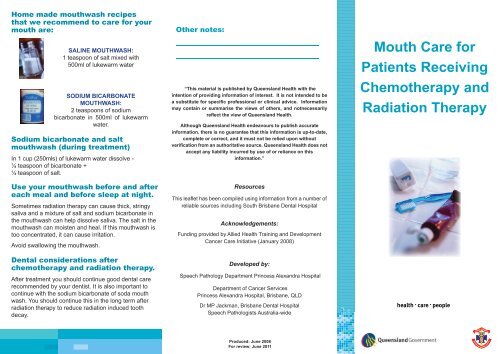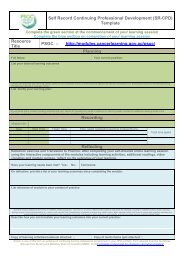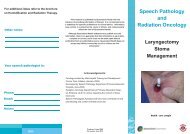Mouth Care for Patients Receiving ... - Cancer Learning
Mouth Care for Patients Receiving ... - Cancer Learning
Mouth Care for Patients Receiving ... - Cancer Learning
Create successful ePaper yourself
Turn your PDF publications into a flip-book with our unique Google optimized e-Paper software.
Home made mouthwash recipes<br />
that we recommend to care <strong>for</strong> your<br />
mouth are:<br />
SALINE MOUTHWASH:<br />
1 teaspoon of salt mixed with<br />
500ml of lukewarm water<br />
SODIUM BICARBONATE<br />
MOUTHWASH:<br />
2 teaspoons of sodium<br />
bicarbonate in 500ml of lukewarm<br />
water.<br />
Sodium bicarbonate and salt<br />
mouthwash (during treatment)<br />
In 1 cup (250mls) of lukewarm water dissolve -<br />
¼ teaspoon of bicarbonate +<br />
¼ teaspoon of salt.<br />
Use your mouthwash be<strong>for</strong>e and after<br />
each meal and be<strong>for</strong>e sleep at night.<br />
Sometimes radiation therapy can cause thick, stringy<br />
saliva and a mixture of salt and sodium bicarbonate in<br />
the mouthwash can help dissolve saliva. The salt in the<br />
mouthwash can moisten and heal. If this mouthwash is<br />
too concentrated, it can cause irritation.<br />
Avoid swallowing the mouthwash.<br />
Dental considerations after<br />
chemotherapy and radiation therapy.<br />
After treatment you should continue good dental care<br />
recommended by your dentist. It is also important to<br />
continue with the sodium bicarbonate of soda mouth<br />
wash. You should continue this in the long term after<br />
radiation therapy to reduce radiation induced tooth<br />
decay.<br />
Other notes:<br />
“This material is published by Queensland Health with the<br />
intention of providing in<strong>for</strong>mation of interest. It is not intended to be<br />
a substitute <strong>for</strong> specific professional or clinical advice. In<strong>for</strong>mation<br />
may contain or summarise the views of others, and notnecessarily<br />
reflect the view of Queensland Health.<br />
Although Queensland Health endeavours to publish accurate<br />
in<strong>for</strong>mation, there is no guarantee that this in<strong>for</strong>mation is up-to-date,<br />
complete or correct, and it must not be relied upon without<br />
verification from an authoritative source. Queensland Health does not<br />
accept any liability incurred by use of or reliance on this<br />
in<strong>for</strong>mation.”<br />
Resources<br />
This leafl et has been compiled using in<strong>for</strong>mation from a number of<br />
reliable sources including South Brisbane Dental Hospital<br />
Acknowledgements:<br />
Funding provided by Allied Health Training and Development<br />
<strong>Cancer</strong> <strong>Care</strong> Initiative (January 2008)<br />
Developed by:<br />
Speech Pathology Department Princess Alexandra Hospital<br />
Department of <strong>Cancer</strong> Services<br />
Princess Alexandra Hospital, Brisbane, QLD<br />
Dr MP Jackman, Brisbane Dental Hospital<br />
Speech Pathologists Australia-wide<br />
<strong>Mouth</strong> <strong>Care</strong> <strong>for</strong><br />
<strong>Patients</strong> <strong>Receiving</strong><br />
Chemotherapy and<br />
Radiation Therapy<br />
health care people<br />
Produced: June 2008<br />
For review: June 2011
Why do I need to do special mouth<br />
cares during Chemotherapy and<br />
Radiation therapy treatment?<br />
Chemotherapy or radiation therapy to the head and<br />
neck area can cause changes to the lining of your mouth<br />
and throat as well as your teeth.<br />
Radiation therapy also causes changes in the saliva<br />
and can reduce the amount of saliva you have. Because<br />
saliva protects the teeth, tooth decay can be a problem<br />
after treatment.<br />
During and following chemotherapy and radiation therapy<br />
treatment your mouth needs extra care and attention.<br />
During treatment it is important to check your mouth<br />
daily.<br />
In<strong>for</strong>m the nurse and doctor of any changes such as:<br />
• Swelling<br />
• Pain<br />
• Cracked skin<br />
• Ulcers or<br />
• Redness<br />
Good mouth care<br />
and hygiene can<br />
help keep the teeth<br />
and gums<br />
healthy.<br />
Seeing your dentist<br />
It is advised that you see a dentist be<strong>for</strong>e chemotherapy<br />
or radiation therapy begins and continue to see your<br />
dentist regularly following treatment.<br />
The dentist, nurse, doctor, pharmacist and speech<br />
pathologist can advise you on mouth care and mouth<br />
washes to use.<br />
Cleaning your mouth/ teeth<br />
Clean your gums and or teeth with a soft children’s tooth<br />
brush to avoid damaging the gums. If you have dentures,<br />
remove them and clean them after eating and be<strong>for</strong>e<br />
going to sleep. Clean them with fragrance-free, warm,<br />
soapy water.<br />
Thrush is also common at this time. If you have been<br />
diagnosed with thrush, soak your dentures in sodium<br />
hypochlorite. If your mouth becomes too sore you may<br />
not be able to wear your dentures. Use the toothpaste<br />
your dentist may have recommended.<br />
Why use mouth washes?<br />
It is very important to keep your mouth clean during<br />
chemotherapy and radiation therapy to reduce the effects<br />
of dryness, mouth sores and infections. <strong>Mouth</strong> washes<br />
can help do this.<br />
Saliva keeps the mouth clean and helps to prevent<br />
infection. It also protects your teeth. Chemotherapy and<br />
radiation therapy to the head and neck can cause the<br />
salivary glands in your mouth to produce less saliva. A<br />
lack of saliva can increase the risk of developing tooth<br />
decay, fungal infections or gum disease. The salivary<br />
glands may not recover fully after treatment and a dry<br />
mouth may be permanent.<br />
Regular dental check-ups are essential, as the risk of<br />
developing tooth decay is far greater due to the lack of<br />
saliva.<br />
How do I do mouth washes?<br />
Rinse your mouth well with the mouth wash. Swish and<br />
gargle the mouthwash and spit it out. Use your<br />
mouthwash be<strong>for</strong>e and after each meal and be<strong>for</strong>e sleep<br />
at night.<br />
What mouthwash should I use?<br />
There are homemade, commercially available and<br />
prescription mouthwashes. Ask your dentist, doctor,<br />
nurse, speech pathologist or pharmacist be<strong>for</strong>e buying a<br />
mouth wash. <strong>Mouth</strong> washes that do not contain<br />
alcohol are recommended. Alcohol can dry and irritate<br />
the lining of your mouth.







